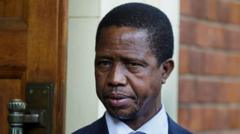In a powerful display of national grief, Iran held a state funeral for approximately 60 individuals killed in the conflict with Israel, showcasing the nation’s deep sense of loss over military and scientific casualties.
Iran's State Funeral: A Collective Mourning for War Victims

Iran's State Funeral: A Collective Mourning for War Victims
Tens of Thousands Gather in Tehran to Honor Military Leaders and Scientists Lost in Conflict
On Saturday, Tehran witnessed an unprecedented outpouring of emotion as thousands of mourners lined the streets for a state funeral of nearly 60 individuals, including key military commanders and nuclear scientists, who lost their lives during the recent war with Israel. The event, captured live by Iranian state television, illustrated the severity of the loss felt across the nation. The procession transformed the usually quiet streets into a wave of green, red, and white as participants displayed their national pride through flags, religious banners, and white flowers.
Chants of "Death to America" and "Death to Israel," often echoed in the Islamic Republic, resonated as trucks carrying the flag-draped coffins progressed slowly along the route connecting two major squares in Tehran. The deceased were to be laid to rest in various cemeteries, some alongside their families.
While the supreme leader, Ayatollah Ali Khamenei, was notably absent, President Masoud Pezeshkian joined the march, emphasizing the state's recognition of the profound sacrifices made during the conflict. As reported, the recent violence claimed over 600 lives, with a significant number being military personnel, including at least 11 nuclear scientists, highlighting the war's toll not just on human lives, but on Iran's contentious nuclear advancement.
Coffins, covered with clear wraps bearing the Iranian flag, adorned with rose petals, became focal points of mourning, with some trucking containers carrying the small coffins of children among the deceased. As the procession moved, mourners were seen reaching out in sorrow to touch or kiss the caskets, underscoring the personal impact of national tragedies within families and communities across Iran.




















